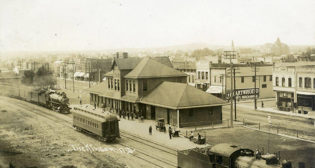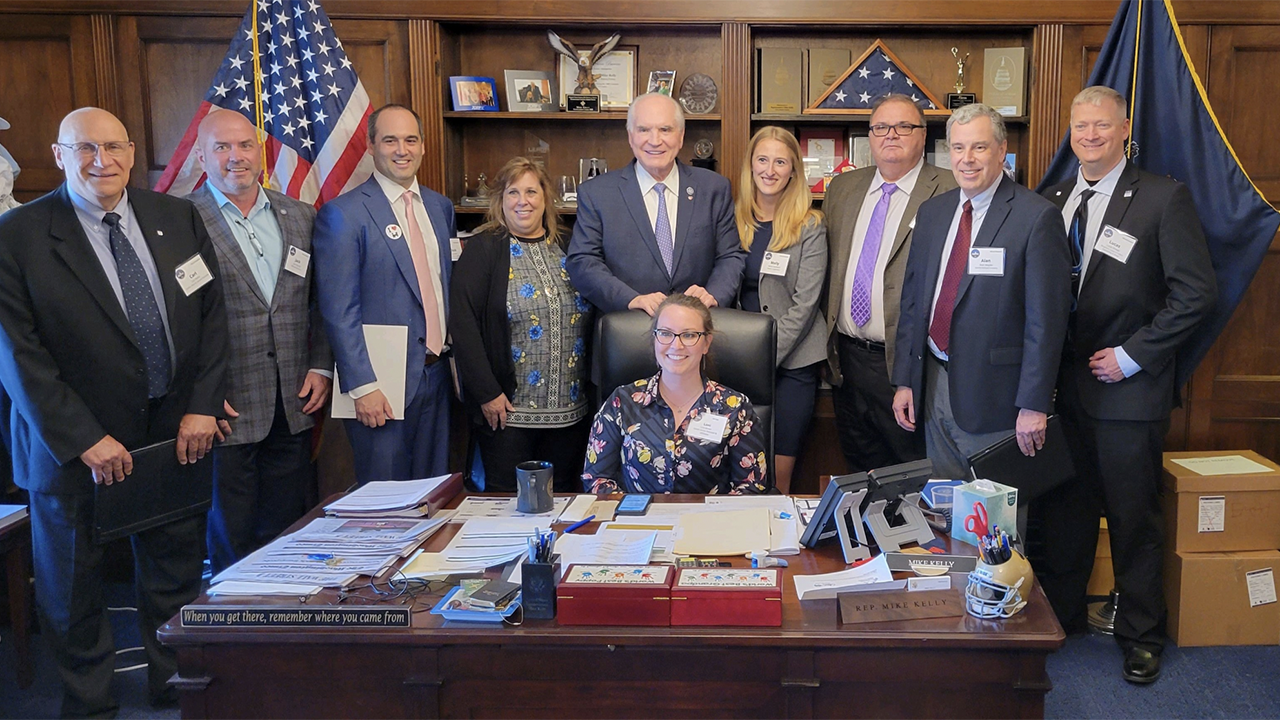
Short Lines Gather for Inaugural ‘Advocacy Day’
Written by Marybeth Luczak, Executive Editor
ASLRRA on May 17 reported via Twitter: “Meeting Rep. @MikeKellyPA today was wonderful! We had the chance to talk with him about how providing robust funding for infrastructure investments for #ShortLines is a proven way to help improve the industry’s (already excellent) safety record. #ASLRRAAdvocacy” (ASLRRA Photograph, via Twitter)
More than 150 representatives from Class II and III railroads, suppliers and supporting associations participated in the inaugural Short Line Railroad Advocacy Day, which was held May 17 in Washington, D.C. They met with 176 congressional offices to “urge lawmakers to craft legislation carefully; support funding for Consolidated Rail Infrastructure and Safety Improvements (CRISI) grants and the Short Line Safety Institute (SLSI); oppose efforts to increase truck length and weight; and support federal disaster relief for short line railroads,” according to organizer American Short Line and Regional Railroad Association (ASLRRA).

“The Association advocates for short lines every day in Washington, but nothing beats our small railroad members coming into town to personally explain how Congressional action impacts their critical contributions to the U.S. freight rail industry and the greater supply chain,” ASLRRA President Chuck Baker said prior to the event. “This year, in the face of six bills being considered in Congress addressing rail safety, it is more critical than ever that our members come to Washington to share their unique American success story. We will urge Congress to wield their pens with precision to create a regulatory environment that allows us to remain nimble enough to provide cost-efficient service to our customers, address safety concerns, and contribute as the critical connector to freight rail service for thousands of customers across the country—particularly in rural and small-town America.”
Meetings in both the House and Senate took place during business hours, with a late-afternoon reception to close the day’s events. Reception attendees included advocacy day participants, federal agency representatives, congressional staffers and members of Congress.
According to ASLRRA, in 2023, the industry will call upon Congress to:
- “Craft legislation carefully to address specific safety issues, avoiding mandates that do not provide a proven safety benefit and that would risk diverting finite resources away from efforts such as upgrading railroad track, or worse, would risk shifting freight from rail onto public roadways, putting short lines out of business, and hurting shippers and local economies.
- “Support funding for the CRISI program … Since 2017, more than $1.5 billion in CRISI funds have been invested, helping build a world-class, sustainable network for freight rail. Short lines in 47 of 50 states and hundreds of shippers have directly benefited from the CRISI program.
- “Support funding for the SLSI, which improves safety culture awareness and practices for small railroads. Thanks to federal funding, SLSI provides training at no cost to railroads, including leadership and hazmat training.
- “Oppose all efforts to increase truck length or weight limits, including any pilot programs. Congress should reject these measures because bigger and heavier trucks will shift freight from rail to trucks, increasing hazards to the driving public, increasing the costs of road maintenance, and causing a negative impact on the environment. Bigger and heavier trucks increase road congestion and lead to a higher crash risk. In addition, moving freight by truck instead of rail increases greenhouse gas emissions by up to 75%, reversing the environmental benefits of rail transportation.
- “Support disaster relief for short line railroads. With the rate of natural disasters like hurricanes, wildfires, earthquakes and floods increasing, Congress should ensure small railroads have the necessary resources after catastrophic natural disasters to help rebuild, instead of being forced to end operations, abandon customers, and disrupt the supply chain.”



